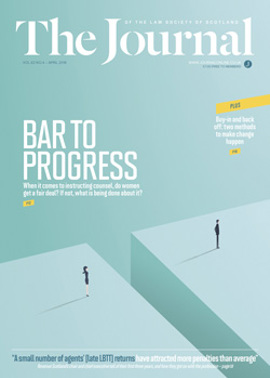Where did the money go?

The world has gone digital and electronic. The evidence is all around us: social media, electronic banking, email, websites, downloaded music, digital photographs and so on. Most recently focus has concentrated on “cryptocurrencies”. Names like Bitcoin have entered the lexicon. And there are are others such as Ethereum, Ripple, and even Scotland’s very own Scotcoin. Investment in such things has boomed.
Legal nature of cryptocurrency
The first question is: from a legal point of view, what is the nature of cryptocurrency? The essence of all cryptocurrencies is that they comprise a digital ledger which sets out transactions in digital code. That digital ledger bears entries that give the holder assets in the form of “currency”, which can then be used. These entries cannot be touched physically. Thus they are incorporeal. Furthermore, like shares in a company, they are assets gained through the payment of money (Erskine, Institute, II ii 8).
An incorporeal thing can exist even though it does not involve rights and duties. An example of a thing without rights and duties is energy or power – as in Bentley Bros v Metcalfe & Co [1906] 2 KB 548 – or even data in digital form, the supply of which to consumers is regulated by the Consumer Rights Act 2015. Looking at the matter in the round, there can be little doubt that the entries in a holder’s digital ledger are incorporeal moveable property.
Where is the estate situated?
The location of cryptocurrency is important in relation to an executor’s powers of administration. It is well established that, unless a foreign jurisdiction recognises the title of a Scottish executor, only estate falling to be administered under Scots law vests in a Scottish executor: Succession (Scotland) Act 1964, s 14(1). The general rule is that estate is administered by a Scottish executor under Scots law only where the estate is located in Scotland. Where then, is cryptocurrency located?
One of the unique features of cryptocurrency is that the ledger is located on a blockchain, which is kept on multiple computers with each copy being identical. These computers can be situated anywhere in the world. There is no centralised database or server. This is the very essence of cryptocurrency and enables independent verification of transactions and prevention of double payment. These verifications and transfers are carried out with powerful computer technology by computer users known as “miners”, who are then rewarded for their efforts with cryptocurrency.
While cryptocurrency is new, the law has required to deal with analogous situations before. It is well established that shares are located in the jurisdiction where they can be dealt with by the holder effectively. A company may have more than one share register, which need not be in the country of incorporation. Where that occurred the courts have held that shares were located in the country where the holder was most likely to register a transfer: Standard Chartered Bank Ltd v Inland Revenue Commissioners [1978] 1 WLR 1108; R v Williams [1942] AC 541.
Given that the cryptocurrency exists on blockchains throughout the world, it is accessible – and therefore transferable – only through a digital “wallet” which holds the public and, crucially, the private keys (located through passwords), which the holder requires to use in order to access the currency ledger and make transfers. The digital wallet is a piece of software which can be kept in a number of locations. It can be on the holder’s own computer, mobile phone, or a hardware storage device suitably encrypted. It can also be held by a third party whose server may or may not be in Scotland. There can be – and it is recommended for security purposes that there are – more than one wallet.
Applying the share-dealing approach to cryptocurrencies with entries all over the world, it is suggested that the cryptocurrency will be located in the country where the wallet most likely to be used by the deceased was present. For example, if the wallet was on the deceased’s mobile phone in Scotland at the death, it is likely that the cryptocurrency will be located in Scotland. However, if the sole wallet was in the hands of a foreign third party, the location might well be abroad.
If the cryptocurrency was in Scotland as at death, it will have to be entered in the inventory as an item of estate in Scotland. It is suggested that the type of currency and the amount be entered in the inventory together with an estimated valuation.
If the cryptocurrency was abroad, then a Scottish executor’s powers will be limited, and steps will have to be taken in the other jurisdiction to recover the currency without the Scottish executor acting beyond his or her powers.
Onus on the executor
Executors have a duty to act reasonably to ingather the estate of the deceased. This will include any cryptocurrency of which they are or should be aware. The cryptocurrency cannot be transferred by the holder without use of the passwords. It is therefore essential that the executor obtain the passwords to enable the cryptocurrency to be transferred. In other words, unless the deceased has left some means of notifying these passwords to the executors, the cryptocurrency will be left inaccessible and non-transferable. It may, in fact, be left entirely valueless.
The task of the executors is to act reasonably and prudently to find the passwords and access the digital wallet. They can either preserve the cryptocurrency for onward transmission of the currency to an heir or legatee, or sell it. Unless the cryptocurrency was bequeathed as a specific legacy, the executor will have to act with reasonable prudence in deciding what to do with it, in a similar way to the handling of shares in the estate. Given the volatility of virtual currencies at present, executors may have to act quickly.
Problems of omission
There is always a possibility of estate being discovered after the administration has apparently come to an end. However, it is suggested that this is more likely with cryptocurrency. This is because of the critical nature of the passwords for access to the digital wallet. For theft of cryptocurrency, little is required other than access to the passwords. Holders are therefore advised to take strict measures to ensure that the passwords, or more often passphrases, are kept secret and secure. This can be incompatible with their mention in wills or documents such as letters of wishes. Wills and letters held by solicitors or banks are likely to be more protected, but even there, there is a risk that a member of staff could gain access to passwords and take the currency.
For these reasons there are many suggestions on the internet as to means of protection of passwords. Ultimately these depend on entrusting the passwords to one or more persons, or dividing the password between such persons with instructions to inform the executor on death. It is quite possible, however, that the instructions could be forgotten, in which case the cryptocurrency could be, hopefully only temporarily, lost. In one well-known US case, an early miner of bitcoin died in a plane crash but did not leave sufficient instructions for his father to access his bitcoin wallet. Years later, the bitcoin, thought to be of very considerable value, remains inaccessible.
Ultimately there must be a duty on the holder of such passwords to come forward to the executor and pass on the information to allow the asset to be accessed. This would then require the executor to execute an additional inventory of estate and obtain an eik to the confirmation. The currency could then be cashed or transferred in accordance with succession law.
Need to know
While some government control may well be imposed on cryptocurrencies in the future, the digital nature of virtual currencies is likely to continue. Indeed Estonia is planning to launch its own state cryptocurrency. As we become more comfortable with all things digital, cryptocurrencies are likely to become more popular in one form or another. In short, everyone dealing with succession or inheritance should be familiar with at least the basic procedures to allow the proper and successful transfer of such assets on death.
In this issue
- Fair instructions?
- The peasants have no bread
- Bad weather – adverse consequences?
- Defending children’s human rights in Scots law
- Scottish income tax – where are we now?
- Appreciation: Professor Emeritus Alexander John ("Alastair") McDonald
- Reading for pleasure
- Opinion: Gordon Addison
- Book reviews
- Profile: Paul Mosson
- President's column
- RoS welcomes new Keeper
- People on the move
- Fair instructions? (1)
- Law: not just a profession, but also a business
- Buying in and backing off
- Tax and the common touch
- Needs of the user
- Where did the money go?
- Five FOI tips every lawyer should know
- AI – the legal and ethical minefield
- Too long, too long?
- Times still a-changin' in '18
- An infrastructure levy for Scotland
- Tax changes to termination payments
- GDPR and the cloud
- Tide runs for lenders
- Passing on a pension to the right person
- Know your FTAs
- Scots to co-host ICW in Toronto
- Office of the Public Guardian: EPOAR and more
- Public policy highlights
- Our survey said...
- Q & A corner
- A profit without honour
- Appreciation: Professor Emeritus Alexander John ("Alastair") McDonald WS
- Ask Ash
- ASPIC finds its feet
- Pushing for change






